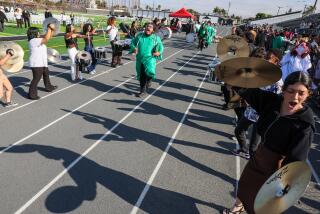Student Repays Teachers for Lessons in Life
- Share via
CLAREMONT — When Naisan Geula’s mother asked him what he wanted for a graduation present, the Claremont High School senior didn’t ask for a car or a ski trip.
What Geula wanted was a home-cooked meal and an evening of good fellowship and songs for a special group of friends: all of his former teachers, first-grade through high school.
He wanted to thank them.
“In a lot of ways they shaped my character when I was young,” said Geula, now a ripe old 17. “By their great zeal and their own example, they showed me what it was like to be an adult.”
“I was Naisan’s second-grade teacher,” said Charlyne Warren of Chaparral Elementary School, identifying herself for posterity before a video camera held by a family friend at last week’s dinner.
“I was going to tease him and say, ‘Let me see your handwriting,’ ” Warren said. “He had so many ideas. He just couldn’t express them fast enough.”
Retired teacher Julie Hardison said the bearded young man had grown a lot since he was in fifth grade at Foothill Country Day School. “He didn’t enjoy writing papers too much,” she said. “He enjoyed talking.”
By 7 p.m., the Geula living room looked like a faculty lounge; 18 of the 30 teachers invited were there. As teachers do, they talked shop, discussing their schools and pupils through much of the evening.
The student most on people’s minds was Geula, an honors student who is graduating a semester early to do Bahai church-related service on St. Christopher Island in the West Indies. Geula eventually hopes to attend medical school.
By leaving school early, said high school counselor Lynn Piatt, Geula will miss the prom, graduation, the senior party and the senior awards assembly. “His focus has been more and more his Bahai religion,” she said.
Geula plays the piano, races bicycles, runs cross-country and studies Persian and Arabic in his spare time. But he also finds his classes entertaining; he said his teachers made him this way.
“In math, you work and you work and you work and, once you get it, it’s exhilarating,” he said. “Something like biology and history--where there’s a lot of memorization of facts and process--once you understand something fully, it’s really neat to be able to apply it. English is great. To me, it’s like a way to expand a lot of philosophical horizons. To me, reading a book is like taking a trip. You can completely leave your environment and go somewhere else for a time.”
Geula’s enthusiasm about school sometimes puzzles his classmates. “You hear comments like, ‘Naisan’s so strange,’ ” said Ezra Parker, 17. “He bugs people who don’t like his comments or attitude. He doesn’t belongs to any cliques. He doesn’t conform to anyone else’s standards.”
Parker was among a handful of friends invited to the party. So was Adam Metwalli, 18, who looked around the room and noted, “it’s kind of like a flashback.” Given the chance to commemorate his own graduation, “I’d probably go on a trip of some kind. A gathering like this would never have occurred to me.”
In Geula’s family, such an event makes perfect sense. “I am overwhelmed to see so much energy, craftsmanship, has gone into the education of one person,” Naisan’s mother, Keysan Geula, told the teachers.
Naisan’s father, a Pomona doctor, agreed. “There are a few things in life you cannot repay,” said Arsalan Geula, a native of Iran. “One of them is teaching.”
Ann Gallagher, seventh-grade math teacher at Foothill Country Day School, confessed she had never expressed such gratitude to her own teachers. “You really don’t, lots of times, see the point of what people are, quote, forcing you to do. Your interests are social and that kind of thing.
“I think what happens is, especially when we push children hard, they just see what they’re missing out on, and not the advantages they’re getting from an education. Later on, many of them are struck by the value of what they had.”
High school literature teacher Marilyn Penn preferred to take less credit. “By the time I get them in high school,” she said “if they’re already turned off or on drugs, there’s very little I can do.”
But she didn’t minimize the value of a thank you from a student to remind her why she was going to work the next day.
“We teachers give each other some taps on the shoulder and some applause,” Penn said. “And a student’s achievement is a form of appreciation. But I know the importance of a good hand-clap at the end of a performance.”
More to Read
Sign up for Essential California
The most important California stories and recommendations in your inbox every morning.
You may occasionally receive promotional content from the Los Angeles Times.











